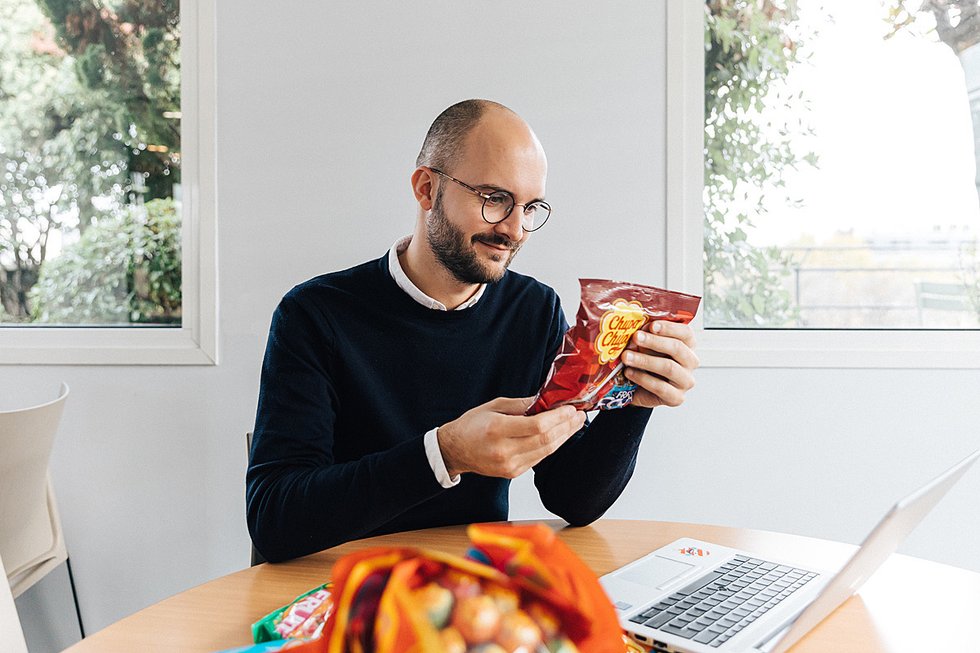The dos and don’ts for success as a Brand Manager
21. 1. 2020
5 min.

The name says it all: a brand manager is the guardian of the brand. But as most job titles are deceptively simple, we met up with Hugues Leydier Delavallade, an expert in the field, to find out more. Having learnt the ropes working for the likes of Lesieur, which makes vegetable oils and dressings, and confectionery company Carambar, he’s now brand manager for Chupa Chups.
The function and role of brand manager may change according to the size of the company, but brand managers always know their brand and, more often than not, a specific product inside out. Delavallade’s top three buzzwords? Development, whether it’s of a brand, range or product, activation, which describes operational activities aimed at engaging consumers, and communication. Here are Delavallade’s top tips on how to achieve those key aims and become a successful brand manager.
DO: be good with numbers
A brand manager’s role is to develop, launch and communicate a brand in such a way that it stands out from the crowd. This requires imagination, an interest in consumer demand and the ability to develop a vision for the product and brand. However, it also demands an analytical mind. “Analysis is 30% of our business,” Delavallade explains, even if that percentage is greatly influenced by team size. Understanding consumers through data collection is critical to the success of any brand or product. “Through the tests and research we do, we gain and refine our knowledge of consumer behaviour and desires,” he says. “This allows us to plan for events that may take place in the coming months or tweak specific points related to our product launches or new communications.”
“Through the tests and research we do, we gain and refine our knowledge of consumer behaviour and desires.”
DO: dare to gamble
Brand managers might be driven by trends, market intelligence and communication, but they are taking a gamble with every product launch. They play a part in product design, the timing of the launch—often strategic—and communication methods. They not only analyse markets and consumer patterns, but also use their instincts. “Media such as L’ADN or Stratégies help us to take a step back and interpret the trends, because those trends may or may not be worth checking out!” You need a good sense of timing and must avoid following trends so closely that you end up entering a market too early. The idea is to hedge your bets on those waves of consumer desire that fit the personality and vision of your brand and then make your move when the tide is high.

DON’T: lose patience
A product launch is built in many stages. There’s extensive research for upstream marketing, product development and design, which all take a lot of time and are labour intensive. To this end, brand managers must work with specialised agencies, act as a go-between for these agencies and the brand, discuss ideas and carry out numerous tests. According to Delavallade, this can go on for years. He is undeterred by such a lengthy process, however. “It can be really frustrating when you realise the product you’re working on won’t be on shelves for one, two or three years,” he explains. “It means you must focus on the result, or else you’d give up. When you finally get to see the product, it feels great.”
“ It can be really frustrating when you realise the product you’re working on won’t be on shelves for one, two or three years.”
DON’T: be vague
A brand manager acts like a conductor, directing the performance of multiple teams and using key information to bring a specific product to life. They must be precise and skilled at formulating requests, feedback and comments. “My role is to come up with a clear brief so that the creative, design or communications agency I’m working with will be able to meet my demands to develop the brand in a certain way,” says Delavallade. The clearer you are, the more convincing you will be, which saves everyone an enormous amount of time. And, even more importantly, you’ll also increase the satisfaction of your end user.

DO: place your trust in others
At the same time, you must understand how to stay within the boundaries of your role and trust the experts you’re working with, because they are there to support you. Delavallade recommends not getting bogged down in the details, for instance, when producing a video. “When marketing interferes with an area outside its remit, that’s a pretty bad sign. We’re not experts. I can only understand why something is done in such a way and ensure it addresses the original issue.” The same applies to more technical matters, such as buying advertising space. When the mechanics are complex, you must know how to surround yourself with the right team of specialists.
“When marketing interferes with an area outside its remit, that’s a pretty bad sign.”
DON’T: gloss over the details
For brand managers, everything is a question of detail, “to the point of seeming a little ridiculous”, admits Delavallade. “You can argue about a very specific shade of red for hours on end. You’ll leave no stone unturned looking for the best colour to illustrate your product. Depending on things like brightness and saturation, the end result will appear warmer, cooler or richer. You have to love the details!” The more experience you have, the sharper your eye becomes, and the more curious you get about the little things that may seem trivial to others. Take a plastic bottle, for example, and examine it closely. The shape of the bottle, the colour of the label and even the cap have all been considered in precise detail.

DO: be on the lookout
“I visit around 10 websites every morning and evening to see the latest advertising campaigns, new brands or product launches,” explains Delavallade. Always on the lookout for new ideas, he regularly participates in masterclasses and conferences about on-trend topics such as engaging millennials and Generation Z. He also attends trade fairs to meet with agencies and investigate any new offerings they might have. “If you don’t have an inkling about what’s going on around you and the changes that are taking place, you might end up being totally off the mark. You could fail to address consumer concerns or maybe you’ll address them in the wrong way or through the wrong medium.”
“If you don’t have an inkling about what’s going on around you and the changes that are taking place, you might end up being totally off the mark.”
DON’T: be clueless when it comes to digital
Our relationship to the digital world is constantly evolving. Faced with this continual innovation, we are required to immediately adapt to and master these changes. The ultimate goal is to be comfortable with new user behaviours and attitudes—basically, making sure you stay in the loop. According to Delavallade, the digital landscape has much to offer and helps shorten the aforementioned lengthy process of product creation. “Digital allows us to be more flexible and helps us to reach our targets with much greater accuracy. When I run a campaign on Snapchat or Instagram, I can tell a story directly to my consumers and get virtually immediate results.”

DO: shift seamlessly between micro and macro
“You can easily spend a morning contemplating brand positioning and then the whole afternoon thinking about the event for a specific product launch. You spend time working out the guest list, speakers, activities and decoration.” In other words, you must embrace the back and forth that takes place between operational tasks and more strategic, wide-reaching goals. This goes hand-in-hand with a desire to work on extremely diverse subjects with a wide range of specialised and complementary teams. “When I was younger, I didn’t really know what I wanted to do. Now, I actually have more interests than I can count! Because I find so many things interesting, I really love the fact that my job provides such variety. I’m in contact with many different people across a wide variety of professions. I learn something new every day, I deal with numerous tasks simultaneously and I have my independence.”
“Because I find so many things interesting, I really love the fact that my job provides such variety.”
Translated by Andrea Schwam
Photo by WTTJ
Follow Welcome to the Jungle on Facebook and sign up for our newsletter to receive our best articles every week.

Viac inšpirácie: Odvetvia a povolania

The good, the bad, and the ugly behind seasonal work
Seasonal work can allow you to travel the world, learn new skills and meet new people, but is it all sunshine and roses?
17. 7. 2024

What about the jobs ChatGPT could create?
While warnings of a labor apocalypse grow louder, some experts believe AI will increase demand for human workers
20. 2. 2023

What if college isn’t the only route to success
As the US suffers from a shortage of plumbers and electricians, becoming a tradesperson can be very lucrative. So why do so few Americans consider it?
11. 1. 2023

5 big data careers that just keep growing
“Big data” is currently one of the most sought-after areas of tech expertise. But what are the different roles you could take?
27. 4. 2022

Product owner vs product manager – What’s the difference?
Product managers and product owners are multidisciplinary roles that create new products and improve ones that already exist... Huh?
17. 3. 2022
Novinky, ktoré to vyriešia
Chcete držať krok s najnovšími článkami? Dvakrát týždenne môžete do svojej poštovej schránky dostávať zaujímavé príbehy, ponuky na práce a ďalšie tipy.

Hľadáte svoju ďalšiu pracovnú príležitosť?
Viac ako 200 000 kandidátov našlo prácu s Welcome to the Jungle
Preskúmať pracovné miesta